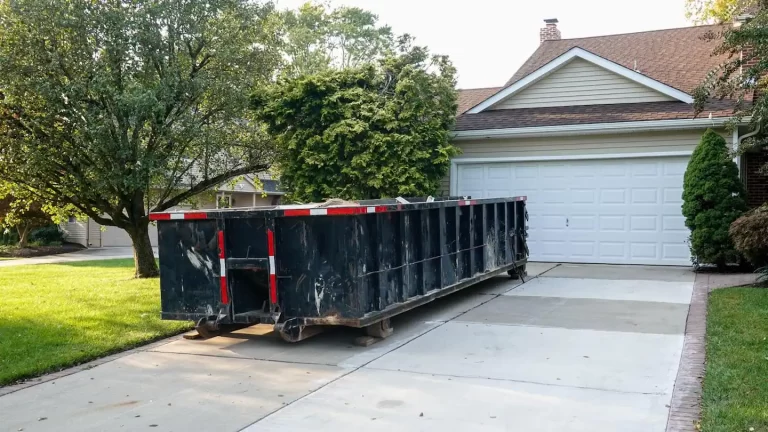Dumpster Rental | Does Dumpster Rental Include Disposal

Proper waste disposal is crucial for environmental health and safety. Emphasize the significance of managing waste responsibly. Dumpster rental plays a pivotal role in waste management, providing a convenient and organized way to handle various types of waste, from construction debris to household clutter. However, the question remains: Does dumpster rental include disposal? In this blog, we'll explore the ins and outs of dumpster rental, shedding light on what it typically includes and what responsibilities fall outside its scope. Understanding these aspects is essential for effective waste management and cost-conscious decision-making.
What is Dumpster Rental?
Dumpster rental is a service that provides individuals, businesses, and construction projects with a temporary container to collect and manage waste materials efficiently. It's a practical solution for handling large volumes of debris, trash, or junk that may accumulate during various activities. Whether renovating your home or managing waste from a construction site, dumpster rentals offer a hassle-free way to keep your surroundings clean and organized.
Different Types and Sizes of Dumpsters
Dumpsters come in various types and sizes to accommodate different waste disposal needs. Common types include roll-off dumpsters, front-load dumpsters, and rear-load dumpsters. Sizes range from small 10-yard containers suitable for household cleanouts to massive 40-yard dumpsters ideal for significant construction projects.
What's Typically Included in Dumpster Rental?
Dumpster rental services provide a convenient, organized waste management solution. This blog explores critical components of a typical service, providing insight into what to expect.
- Dumpster Delivery and Placement: A dumpster rental includes delivery and placement at a specified location, with specialized trucks transporting various containers. Proper placement ensures easy waste disposal and compliance with local regulations and safety standards.
- Rental Duration: Dumpster rental provides flexibility in duration, accommodating projects of various durations. It's crucial to communicate rental duration accurately to avoid additional charges for exceeding agreed-upon timeframes.
- Pickup and Removal: Upon completion of the rental period, the company handles pickup and removal, dispatching a team to retrieve the container and ensure proper waste disposal. This hassle-free service is a crucial benefit of dumpster rental.
- Weight and Size Limits: Dumpster rental packages have predefined weight and size limits, so choose the right size for your project to avoid overage charges and ensure safe transportation. Discuss these limits with the rental company to find the best fit for your needs.
- Local Regulations and Permits: Navigating local regulations and permits is a complex waste management task. Professional dumpster rental services can help customers obtain necessary permits, saving time and avoiding legal hassles.
Dumpster rental is a comprehensive waste management solution with delivery, placement, pickup, and local regulations. Communicate needs, understand additional charges, and ensure proper utilization to streamline waste management and create a cleaner environment.
The Cost of Dumpster Rental
Understanding the factors influencing dumpster rental costs is crucial for efficient waste management. This guide explores various elements and offers tips for saving on expenses.
Factors Influencing the Rental Cost
- Dumpster Size: The size of the dumpster you choose significantly determines the rental cost. Larger containers typically have a higher price tag, as they can hold more waste. Smaller dumpsters are more budget-friendly and are suitable for projects with limited waste.
- Rental Duration: The duration you need the dumpster is another key factor. More extended rental periods will naturally cost more than shorter ones. Estimating your project's timeline accurately is essential to avoid unnecessary expenses.
- Location: The geographic location where you need the dumpster can affect the cost. Rental rates can vary from one region to another, and even within the same city, depending on local demand and operating costs for the rental company.
- Type of Waste: The waste you dispose of also impacts the cost. Certain types of waste, such as hazardous materials or electronics, may require special handling and disposal, incurring additional fees.
Additional Fees
Aside from the base rental cost, there can be additional fees associated with dumpster rental. These may include:
- Overweight Charges: You may face extra charges if you exceed the weight limit for your chosen dumpster size. It's crucial to be aware of weight restrictions and manage your waste accordingly.
- Permit Fees: Depending on your location and local regulations, you might need a permit to place a dumpster on public property. Permit fees are typically not included in the rental cost.
- Extension Fees: You may incur extension fees if you need to extend your rental period beyond the initially agreed-upon timeframe. It's advisable to plan your rental duration carefully to avoid this.
Ways to Save on Dumpster Rental Costs
While various factors influence dumpster rental costs, there are several strategies to save money:
- Optimize Dumpster Size: Choose the right-sized dumpster for your project to avoid paying for unnecessary capacity.
- Accurate Rental Duration: To avoid extending the rental and incurring additional charges, plan your rental duration accurately.
- Shop Around: Compare quotes from different rental companies to find the most competitive rates in your area.
- Consider Group Rentals: If neighbors or nearby businesses have similar waste disposal needs, consider sharing the cost of a larger dumpster.
- Recycle and Separate: Minimize the waste in the dumpster by recycling and separating materials. This can help you stay within weight limits.
Understanding the factors influencing dumpster rental costs and being mindful of additional fees can help you make informed decisions. By carefully managing these factors and implementing cost-saving measures, you can efficiently handle waste disposal while staying within your budget.
What Is Not Included in Dumpster Rental?
Dumpster rental is crucial for efficient waste management, but knowing what needs to be included is essential to avoid unexpected costs and comply with local regulations.
Disposal Fees
One of the most critical aspects often excluded from dumpster rental costs is disposal fees. While the rental fee covers the delivery, pickup, and temporary use of the dumpster, it does not include the actual disposal of the waste. Disposal fees can vary widely depending on your location and the type and quantity of waste you're disposing of. Budgeting for these fees separately is essential, as they can significantly impact your overall waste management costs.
Overweight Charges
Dumpster rental companies impose weight limits on their containers to ensure safe transportation and disposal. You can expect to incur overweight charges if you exceed these weight limits. These charges can be substantial and are typically calculated based on the excess weight. To avoid unexpected expenses, it's crucial to monitor the weight of your waste and select an appropriately sized dumpster.
Prohibited Materials
Dumpster rental agreements often come with lists of prohibited materials. These materials are typically hazardous or pose a risk to the environment and must not be placed in the dumpster. Everyday prohibited items may include:
- Hazardous chemicals: Such as paints, solvents, and asbestos.
- Electronics: Such as TVs, computers, and appliances.
- Tires: Due to their environmental impact.
- Batteries: These can leak harmful chemicals.
- Biological or medical waste: Including needles and syringes.
It's essential to adhere to these restrictions and adequately dispose of prohibited materials through appropriate channels, as violating these guidelines can result in fines and penalties.
Permits and Regulations
The dumpster rental package typically does not include obtaining necessary permits and complying with local regulations. Depending on your location, you may need a permit to place a dumpster on public property, such as a street or sidewalk. Additionally, zoning regulations may dictate where and how dumpsters can be used. You must have the required permits and adhere to local regulations when renting a dumpster.
Dumpster rental offers convenient waste management, but it's crucial to consider disposal fees, overweight charges, prohibited materials, and permits for a smooth, cost-efficient process.
Responsible Waste Disposal
Responsible waste disposal is crucial in today's environmental consciousness, minimizing impact and maximizing resource efficiency. Key components include reducing waste and creating a cleaner, more sustainable world.
Properly Sorting and Preparing Waste
Sorting and preparing waste correctly is a fundamental aspect of responsible disposal. This process involves categorizing waste into different streams, such as recyclables, organic materials, and non-recyclable waste. Proper preparation includes:
- Recycling: Identifying and separating recyclable materials like paper, cardboard, glass, plastic, and metal. Many regions offer recycling programs that make this process easy.
- Composting: Diverting organic waste, such as food scraps and yard debris, from landfills. This reduces waste and creates nutrient-rich compost for gardens and landscaping.
- Hazardous Waste: Ensuring that hazardous materials like chemicals, batteries, and electronic waste are disposed of safely and in accordance with local regulations.
- Reducing Waste: Adopting practices that reduce waste generation in the first place, such as buying products with minimal packaging or opting for reusable items over disposable ones.
Recycling and Environmentally Friendly Disposal Options
Recycling is a cornerstone of responsible waste disposal. Recycling materials conserves resources, reduces energy consumption, and minimizes landfill strain. Most communities offer recycling programs that make it easy to participate. It's a simple yet powerful way to contribute to environmental sustainability.
Responsible waste disposal involves informed choices for the environment and future generations, including understanding disposal costs, proper waste sorting, and embracing recycling and environmentally friendly options.
Many people assume that when they rent a dumpster, it automatically includes disposal services. However, this common misconception can lead to unexpected costs and complications. Imagine renting a dumpster for your home renovation project, thinking you've covered all your waste disposal needs. But as your project progresses, you realize that waste disposal is a separate challenge. You're left grappling with disposal fees, figuring out where and how to dispose of your debris responsibly, and facing potential fines for improper disposal.
Things To Do In Mandeville, LA
Mandeville, LA News

